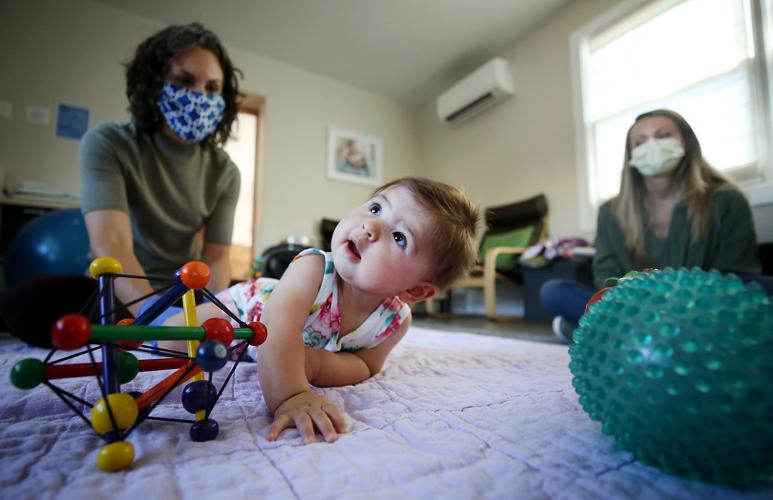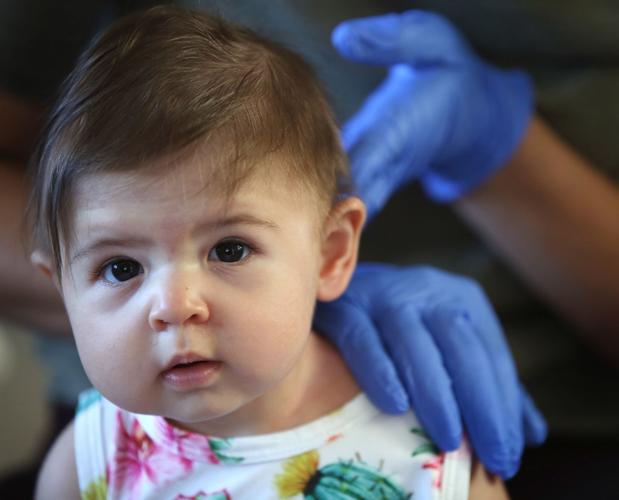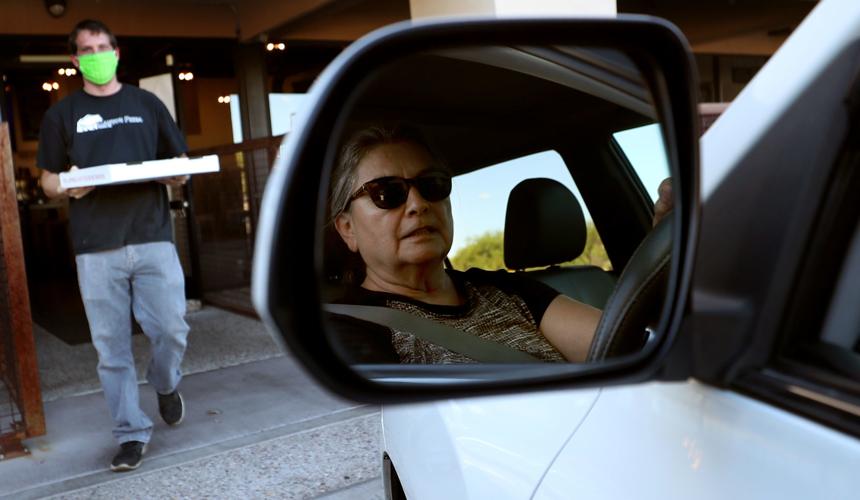When the directors of Second Street Children’s School heard about the federal paycheck loans and SBA loans to help businesses weather the pandemic, they hoped to be able to keep supporting their 18 employees.
But by the time they tried to apply through the bank, all the money was gone.
“I am really angry about the situation,” Second Street director Jenny Barber Douglas said. “I feel like this process was unfair.”
More help is on the way for Tucson businesses like Second Street.
President Trump on Friday signed a $480 billion COVID-19 funding bill that among other things will provide $310 billion in new funding for the Paycheck Protection Program, which offers loans that can be forgiven if businesses rehire employees.
In response to criticism that large companies sapped the initial round of PPP funding, the second round sets aside $60 billion specifically for smaller institutions like credit unions and community banks, which tend to serve the smallest businesses.
While the new round of PPP funding is welcome, it is expected to go more quickly than the first round after the SBA re-opens the application process Monday morning, April 27 — some experts say perhaps in as little as 48 hours.
“If the SBA portal is working and processing applications without delay, it could go very quickly,” said David Lyons, regional president at National Bank of Arizona, adding that the first round of funding would likely have gone a lot quicker if the SBA internet portal hadn’t crashed repeatedly.
Lyons and other local banking and small-business officials say they hope smaller businesses will get a bigger share of the second-round PPP funding.
In Arizona as of April 16, the SBA had approved funding for 19,280 PPP loans totaling $4.8 billion.
The average loan size has been $206,000, with 1.2 million or about 74% of all PPP loans at or less than $150,000, SBA documents show.
Despite outrage over big companies like Shake Shack taking maximum $10 million PPP loans — the company is returning the money — only about 4,400 or about one-quarter of the roughly 1.7 million approved PPP loans were for more than $5 million.
But those loans sucked up about $31 billion or about 9% of the total approved first-round loans of $342 billion, SBA data show.
It was frustrating to see the funding dry up while small businesses desperately need funds, said Ellen Kirton, director of the SBA-funded Small Business Development Center at Pima Community College.
She said it wasn’t surprising that large companies scooped up much of the first-round PPP money, since they have existing relationships with big banks that have plenty of staff to help process applications.
“My observation is that the three big banks naturally have the biggest volume, and the biggest clients, have an automated process,” said Kirton, whose 35-year career in banking included a decade as a vice president for Arizona business banking at Chase Bank.
“With some small businesses, the difficulty was having a person to talk to, someone you had a relationship with at the bank — I always say, ‘know your banker,’” she said.
The SBA also is now requiring applicants to certify that they need a loan to stay in business, said Mike Brown, Arizona president of Washington Federal, or WaFed.
He said the SBA has now also taken into account the applicants’ current business activity and other possible sources of cash.
“It is my hope that by segmenting that chunk of funding for smaller banks, it will help some of these smaller businesses that maybe don’t have these banking relationships,” Brown said.
Kirton, who has been conducting seminars on the COVID-19 loans for local business groups, said the SDBC has helped about 200 local businesses apply for PPP loans in the last few weeks.
Some have won funding, others have been in limbo since the funding was exhausted, she said.
The process of applying for a PPP loan is different than for a regular SBA loan, and in many ways simpler, Kirton said.
The SBA mainly wants payroll data that should be readily available on forms filed with the IRS, she said.
Small businesses are advised to arrive at a total payroll cost, including benefits, to come up with an average over 12 months, then multiply by 2.5 to get the eight weeks’ worth of payroll costs eligible under the PPP program.
Businesses can spend 75% of their PPP loans on payroll costs and the other 25% on operating costs like rent.
Kirton noted that the loans are fully forgivable if the business rehires all its employees after eight weeks, but the forgiven amount is reduced proportionately for each employee not rehired.
The new round of COVID-19 funding also includes $60 million to replenish the SBA’s Economic Injury Disaster Loan program, which offers low-interest loans of up to $2 million and 12 months’ initial delay in payments.
The program is administered directly through the SBA and funds come from the U.S. Treasury, rather than banks.
In Arizona, 460 economic-injury loans were approved through April 19 totaling $96.8 million.
“Open for a blink”
While some preschools are getting by because the state is continuing to pay subsidies for many of the children that were enrolled, others have to find ways to survive the COVID-19 shutdown.
At Second Street, Douglas, associate director Jeri Goldblatt and their teachers are continuing to provide content, on social media and in Zoom sessions, for the 65 families with children enrolled.
At the same time, Goldblatt has kept close watch on the Wells Fargo website to apply for the PPP. On a Friday afternoon a couple of weeks ago she was prepared to apply but the site wasn’t accepting applications — right up until closing time.
When Goldblatt logged back on first thing that Monday morning, she was shocked to find all of the money was already gone.
The application process, Douglas said, was “open for a blink.”
Favoring bigger businesses with more employees suggests the banks are looking for ways to make money instead of helping those most in need, she said.
The two women also applied for the EIDL loan, but received nothing. Goldblatt hopes the federal relief bill that passed this week will give them another chance.
So far, a fundraising event held in March and donations from alumni families are helping, Douglas said, and some families still pay tuition they can claim as a tax-deductible donation.
It’s getting them by, for now.
“Punch in the gut”
The first quarter of this year was the fourth busiest in Natasha Winnik’s 16 years of owning Originate Natural Building Materials, 948 N. Main Ave.
“It seemed like it was going to be a great year, even through March,” she said. Then, when April rolled in, she “felt it break.”
“There are orders trickling in, but it’s not enough to sustain us,” Winnik said. “We’re very thankful for what is coming in, but it’s not going to be enough to pay the bills in May.”
Winnik offers what she calls healthy building materials — such as cork, bamboo, recycled glass and recycled aluminum — and paints, sealers and stains with fewer chemicals.
She has two employees. For now, the business is seeing customers by appointment only.
Winnik applied for the PPP and EIDL loans, but neither came through. Finding out many bigger chain operations got funding was “like a punch in the gut,” she said.
“A lot of the small businesses weathered the 2009 recession,” she said, adding that she paid her employees with her savings and hasn’t recovered that money.
“Keeps me up at night”
When the co-owners of Tucson’s Milk & Honey planned ahead financially, they were thinking of small setbacks — never this.
Lactation consultants Crissi Blake and Nina Isaac have operated the business for five years, offering families help with breastfeeding issues, infant weight-gain challenges, physical therapy and postpartum support.
Under the COVID-19 stay-at-home orders, they worry that moms and babies are isolated. In recent weeks, the business is seeing about 50% fewer clients, as well as unusual delays in payments from insurance providers, Isaac said.
The two are working with their seven other specialists to help families online, over the phone and, more rarely, in their office at 3844 E. Pima St.
Blake and Isaac applied for both the PPP and EIDL loans but neither came through.
When Isaac heard the PPP funding had run out, she said she couldn’t believe it: “I was still hoping that maybe they just hadn’t let us know that we got the loan yet.”
They’ve started a gift-certificate campaign for families who can’t afford help; and they’re getting some help from local nonprofit Nourish.
“The question of how we are going to continue to help families keeps me up at night,” Isaac said.
“Really scary”
Devin Santos and her husband, Austin, opened Bear Canyon Pizza over three years ago.
“Restaurants are always a passion project,” Devin Santos said. “We love people, we love to feed people and we love community and so it’s really the best thing for us.”
Now they’ve had to close the dining room and change the business, which had included about 80% dine-in customers. Curbside takeout and delivery is the new normal.
Devin Santos said she applied for the EIDL loan in March and didn’t hear a word or receive a cent.
And the PPP? “We finally got an email from them saying we could continue and then, on April 16 right after I submitted everything that they asked for, I got another email saying there was no more funding,” she said.
“It’s really scary,” she said. “This is our livelihood, this is our family we’ve created at the restaurant.”
“We didn’t fit the PPP guidelines”
Jane Hamilton Fine Art, a gallery of the work of 50-plus artists, more than half of them local, has been in Tucson for 28 years.
The store, in Suite 180 at 2890 E. Skyline Drive, was open throughout March, but Jane Hamilton changed to appointment-only this month.
To keep things going, she is also hosting an outdoor showing of sculpture artwork from 10 a.m. to 4 p.m. May 2 and 3.
Hamilton hires one person as an independent contract worker but she doesn’t have employees in the typical sense — and that seems to be working against her when it comes to getting help.
“We didn’t fit the PPP guidelines,” she said. “I don’t know who is getting this but it’s certainly not helping someone like me.”
Overall, she said, the process and the outcome felt unfair for small business owners.
It’s disheartening, she said.
“If we want to have culture, we have to keep it alive,” she said. “We’re not asking for a handout, we’re not getting unemployment, we just want to be open.”








